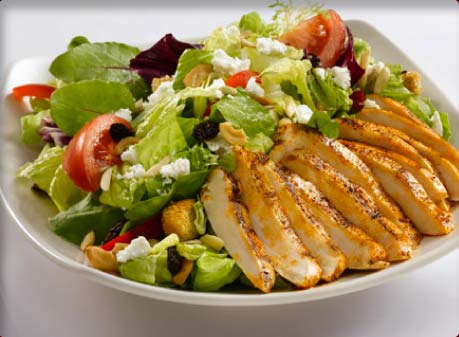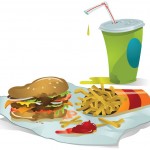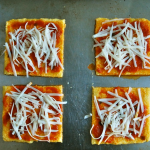Salad is made out to be the king food of weight loss, and I can’t really argue with that. It’s very low calorie, the leafy greens and vegetables increase satiety so you feel full for a longer period of time, and it’s pretty easy to make. Let’s add the fact that salad is healthy, and we have the perfect meal for weight loss. Nonetheless, salad is often avoided because it just doesn’t hit the spot like…a burger and fries. In order to retain the fantastic attributes mentioned above, a salad must contain the bare minimum, and under those conditions most people do not find it very edible. Therefore, many have decided to remedy this conflict, under a false sense of security which I’m about to break down.
Salad can certainly be used to lose weight, but in order for it to be a staple addition to your diet that produces the desired effects, it needs to be eaten the proper way. Assuming you are trying to lower your daily calories so that you can be under your maintenance, a salad can be a great way to keep yourself from overeating. However, let’s face the facts. As mentioned above, in order to get the great benefits of salads they need to contain the bare minimum of ingredients before they start losing their value. As far as I know, eating salad with these requirements is not going to substitute for gourmet food. Nonetheless, if you want the benefits, you’re going to have to stick it through with each bite. Otherwise, you’re spoiling the point of eating that salad for weight loss.
As we’ve stated earlier, the proper way of eating salads to lose weight requires bare minimums. These bare minimums refer to limiting any form of cheese, dressing, and croutons. Salad haters have a point when they say that you’re “eating grass”, because in order to keep it low calorie you can’t immerse yourself in the thickness of the tasty dressing and bomb the salad bowl with croutons. This brings me to my original point about a false sense of security that people have with salads. They believe that because they are eating salad, nothing else matters, they’ve already won by choosing it over anything else. Therefore, some Caesar dressing and frantic amounts of shredded cheese don’t come into play, it’s still salad at the end of the day. Therefore, it’s automatically healthier and lower in calories than any other food they could have chosen. False!
Enjoying that creamy Caesar dressing and that box of croutons definitely puts the salad leagues ahead of what it dreadfully was prior to their addition, but it also defeats the purpose of using it as a weight loss meal. You cannot choose to eat a salad to lose weight and think you can get away with pouring fat dressing, adding loads of cheese, and using those croutons as a substitute for what could’ve been a worse choice of snack. Calories are calories, and whether they come from salad or a cheeseburger, they’re still calories. Not only do these additions usually more than double the amount of calories you’re consuming, but they render choosing the salad for the goal of weight loss practically pointless. You might as well go enjoy a KFC Snacker.
If you want to eat salad to lose weight, do it the proper way:
1) Fat-free dressing does not mean a free dressing joy ride, if you must use dressing make sure its low calorie, and don’t go wild with the amount. Fat free does not mean calorie free. There’s a huge difference.
2) Spare the shredded cheese, it’s not a worthy addition as cheese is loaded with fats that up the calorie count greatly.
3) If you must have croutons, cut the amount in half and split each one in two so you can still enjoy them with each bite but in small portions.
4) If there’s chicken, make sure it is grilled.
5) Load the salad with vegetables, preferably ones you enjoy (hopefully there are some). This way you can make the salad taste better for you than it otherwise would. It won’t be your favorite meal, but it doesn’t have to be your worst either.
I understand that this doesn’t exactly make you run to the kitchen in excitement, but if you are trying to use salads to help lose weight these changes are a must. Sure, the salad might not taste fantastic, but it’ll help accomplish your goals. I think that’s more important than crying over taste. If you really want to change your body, you’ll get used to making some sacrifices. For easing the journey to weight loss, check out our article on Easy Ways To Lose Weight. Good luck!
Incoming search terms:
- best salad dressing for weight loss
- eating salad everyday
- is eating salad everyday good for you
- eating salads to lose weight
- how to make salads for weight loss
- eating salad to lose weight
- what is the best salad dressing for weight loss
- best salad for weight loss
- if i eat salad everyday will i lose weight
- eating salad everyday to lose weight








Through some trial-and-error, I found a way to stick to my substitute-a-big-salad-for-lunch-every-day plan, and the way I’m doing it, I’m confident it will be a lifelong change. But it does take work and commitment! First, I did some reading on the subject and took in the various points of view around the web. Second, I experimented with my salads. Third, I hit upon a sort of rotation and routine that I use that keeps me from barfing every time I have to eat a salad.
I hate salad. I always have. Not salad itself, just the thought of having to eat it. At some point in my middle age, my asthma was getting worse, and I couldn’t control my weight. This was especially hard for me because I used to be an athlete and a classically-trained singer/performer, so lugging around a lot of fat and having trouble breathing while doing it was no fun at all. I made the decision 5 months ago to substitute the “big salad” for my lunch, and in that time, I’ve lost about 15 pounds and started swimming again.
Here’s what I do: I alternate the base of my salad between leafy greens and whole grains. I always add 3 additional vegetables and often a piece of fruit – gleaned from various sources around the web for their nutritional value and their appeal to my taste buds. If the base is leafy greens, I always make sure at least one of the vegetables is not green, whereas if the base is whole grains, I always make sure that at least one of the vegetables IS green. If eating leafy greens, I add about 1-2 oz of protein, in the form of nuts, hemp seeds, canned fish, occasionally meat, hardboiled egg, etc. If eating whole grains, I skip the protein (this was trial-and-error – I found that adding the protein made the whole thing a little too heavy). I go easy on the dressing – leafy greens get treated with a little regular salad dressing (less than an ounce, a drizzle, really), and whole grains get 1 tablespoon of EVOO and 2 tbs of balsamic vinegar. If the fruit I’ve added is a citrus (orange or grapefruit), I only add the EVOO and skip the vinegar.
I hate eating the salad, especially since that’s the meal I bring with me to work. But I also know, from trial-and-error, that the salad will make me feel great the next morning. I’m able to stick to it because of that, and because during the rest of the day, I don’t deny myself ANYTHING. I can eat what I want for breakfast and for dinner – chewing my way through a huge whole grain salad is accompanied by the knowledge that I can reward myself with a good dinner later on. I even eat dessert. I also “rotate” my whole grains among my breakfast foods (I heat it up with some soy milk and eat it like oatmeal).
I’m a lot healthier now – not completely healthy, mind you, but better. My clothes fit again, and I don’t struggle as much walking uphill. It was a change I could live with and that I could make permanent. I often dislike eating my salads and look on with envy at my younger, thinner co-workers enjoying their burgers and fries, but I also know that I can have that burger and those fries another time. Right now, at lunch, it’s salad. Yay me!